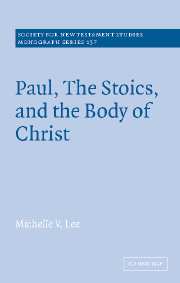Book contents
- Frontmatter
- Contents
- Acknowledgments
- List of abbreviations
- 1 Introduction
- Part I Background: the Stoics, body, and ethics
- 2 The body metaphor
- 3 The “body” in Stoicism and the relevance to universal humanity
- 4 Stoic universal humanity and ethics
- Part II 1 Corinthians and the body of Christ
- Bibliography
- Index of passages cited
- Index of modern Authors
- Index of subjects
4 - Stoic universal humanity and ethics
Published online by Cambridge University Press: 23 November 2009
- Frontmatter
- Contents
- Acknowledgments
- List of abbreviations
- 1 Introduction
- Part I Background: the Stoics, body, and ethics
- 2 The body metaphor
- 3 The “body” in Stoicism and the relevance to universal humanity
- 4 Stoic universal humanity and ethics
- Part II 1 Corinthians and the body of Christ
- Bibliography
- Index of passages cited
- Index of modern Authors
- Index of subjects
Summary
In the preceding chapter I attempted to demonstrate that the Stoic identification of the universe as a “body” was a statement about the unified and organic nature of the universe. In this chapter I will examine the relationship of this conception of the universe to Stoic ethics. We will see that the idea of a bodily universe was applied to a universal and bodily humanity and that Stoic social ethics was based upon the ability to understand the consequences of the nature of a unified humanity. The role of the moral teacher was not simply to instruct the student, but to help him or her grow in reasoning ability so that the student would understand the basic connection between one's relationship to the whole and subsequent ethical behavior. Understanding corporate identity, specifically bodily unity, was the critical component in social ethics.
The goal of ethics
Like many other Greek philosophers such as the Aristotelians, Platonists, and Epicureans, the Stoics considered happiness or εὐδαιμονία to be the goal or τέλος of life. For the Stoics, happiness consisted in “living in accordance with nature,” or the order of the universe. This is the virtuous life. To live in accordance with virtue or nature is to live in accordance with a universal law or right reason. The virtuous life becomes equated with life according to nature because virtue becomes “the goal towards which nature guides us.”
- Type
- Chapter
- Information
- Paul, the Stoics, and the Body of Christ , pp. 59 - 102Publisher: Cambridge University PressPrint publication year: 2006

